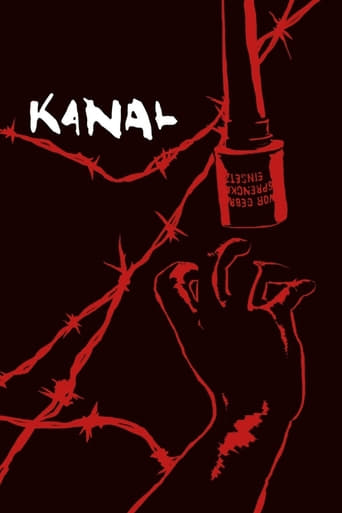denis888
A very heavy movie, extremely brutal, merciless picture of the Warsaw Uprising in 1944. Andrzej Wajda pictured war as a tedious, bloody, messy, dirty, dusty, hopeless, heroic and very terrible affair. The last detachments of active resistance try to fight the overwhelming Nazi forces in Warsaw. The very film is not even about the fight but about the heroic efforts simply to live, to survive, to break through and to win. The whole film is so grim, gory and dark that it is way too difficult to watch it all and not to make a pause just to breathe some air. War is Not fun, and it does show in this movie. The excellent casting of good actors do a decent job, but the film tends to drag and become too tedious and too grim. It presses so much and makes it almost unbearable to see to the unhappy end
Lee Eisenberg
Agnieszka Holland's recent "In Darkness" told the story of a Lwow sewer worker who hid the city's Jewish population from the Nazis. Andrzej Wajda's "Kanał" tells a similar story. Set during the Warsaw Uprising, it looks at some people who have to hide in the sewers. The existence of the three groups of people in this putrid setting is like a descent into the darkest depths of the human soul.This was the second installment of Wajda's War Trilogy, after "A Generation" and before "Ashes and Diamonds". All three serve to not only show the horrors of the Nazi occupation of Poland, but also show how the people push through even in the most desperate situations. In an interview, Wajda noted that the scene where Daisy and Korab find the bars represents the time that the Soviet army (presumably across the river) was approaching Warsaw but waited for the Nazis to actually depart the city so that it would be easier to take. The movie is as much an indictment of Stalinism as it is of Nazism.Anyway, it's definitely a great one. I recommend it.
warsawer
I think everyone who saw this film knows that it's a masterpiece, but maybe not everyone knows how authentic the film is. The writer of the screenplay - Jerzy Stefan Stawinski - is in fact the Lieutenant Zadra responsible for his platoon. Stawinski wrote down his own war experiences here with impressing honesty.Another thing that may be interesting in this film is the main female character - Daisy. She isn't supposed to be a superwoman as some suggested. In fact there were several thousands of women fighting in this uprising. All of them that survived it were given the status of soldiers by Germans. It was the first time in the world's history when women received such a status. During the uprising many of them were carrying mail via sewers, so Daisy is rather a typical character in this role. It would be more surprising if the guide was a man.
MartinHafer
This is certainly NOT a feel-good film, as it deals with the horrors of the Nazis and their crushing of the Warsaw uprising of 1944. After all, there is no way or reason to make this a nice or fun movie to view. It just isn't possible. BUT, we are treated to an intensely realistic and viscerally disturbing film showing the war in all its awfulness. The first portion of the film is set in crumbling buildings and the nobility of the cause is apparent. However, the vast majority of the film is set in the sewers (hence the title "Kanal") and the characters, over time, lose some of their nobility and just ache to survive. The film is intensely claustrophobic and the filth they move about in literally looks like raw sewage--so as the characters fight for life and, in most cases, give up hope, you find yourself being pulled into their world and their terror. A great, though intensely awful film to watch. So, it comes as no surprise that I would not recommend this film to children or people afflicted with claustrophobia.PS--if the musician seems familiar, it's because Wladyslaw Sheybal (also known as "Vladek Sheybal") is one of the Bond Villains in the movie FROM Russia WITH LOVE.



